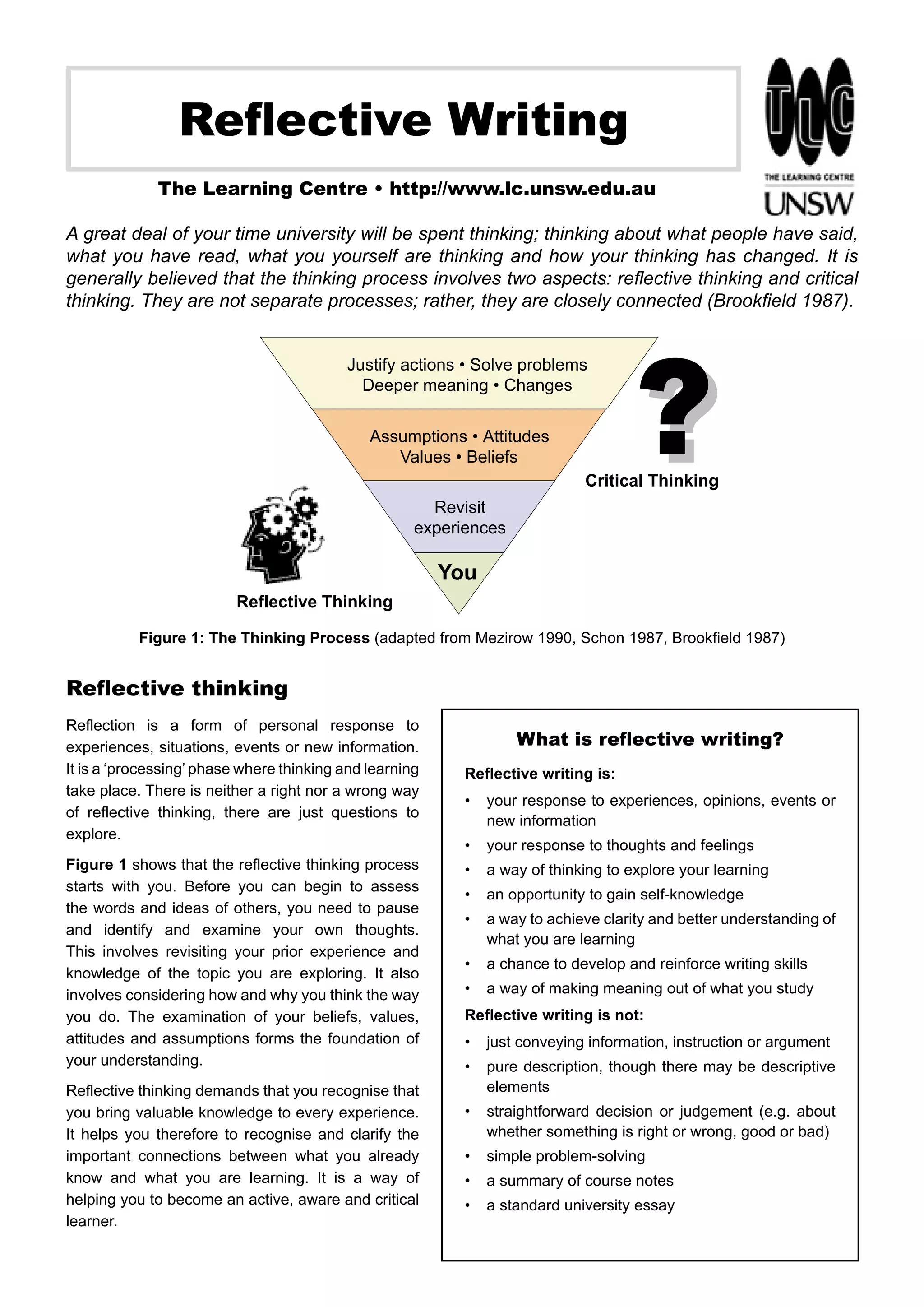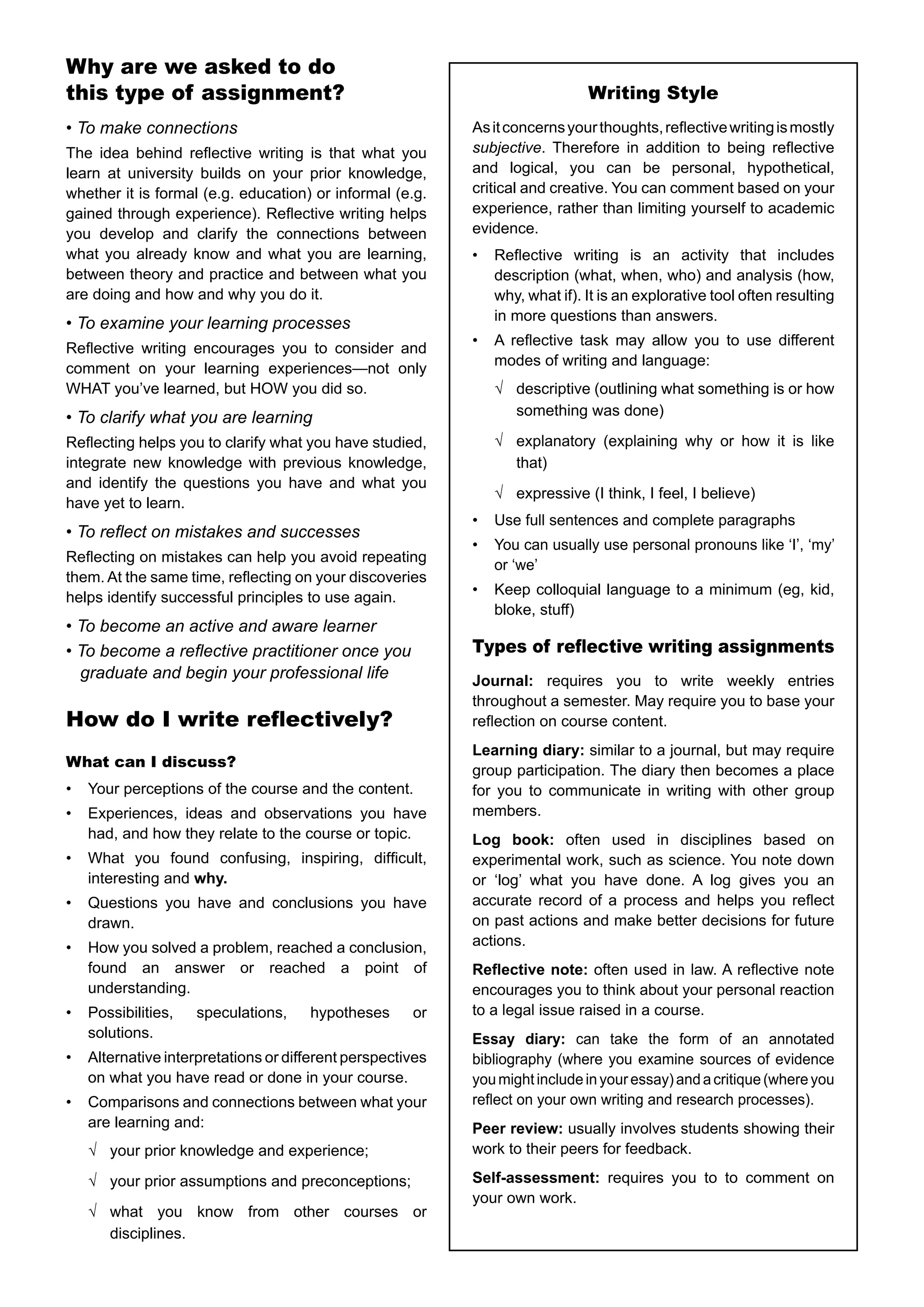The document outlines the significance of reflective writing in university education, emphasizing its role in deepening understanding and connecting prior knowledge with new information. It defines reflective writing, its purposes, and various types of reflective assignments while providing guidelines for writing reflectively. Additionally, it offers tips on starting the reflective process, gathering ideas, and examples of reflective writing exercises.


![• How new ideas challenge what you already know.
• What you need to explore next in terms of thoughts and actions.
Tips to help you in your reflective
writing process
Getting Started
• Think of an interaction, event or
episode you experienced that can be
Clarify your task
connected to the topic
Reflective writing assignments can take many forms, so check
• Describe what happened
the guidelines in your course outline before you begin. Clarify any
• What was your role?
questions or uncertainties with your lecturer or tutor.
• What feelings and perceptions
Clarify the practical aspects
surrounded the experience?
You may need to submit a book or folder or complete an online
• How would you explain the situation to
component. In addition to writing, you may be able to include pictures,
someone else?
diagrams, media clippings etc.
• What might this experience mean in
Gather your ideas
the context of your course?
Before you write, you need to think and reflect. Start by drawing up
• What other perspectives, theories
a Mindmap. Mindmapping is a technique that can help you expand
or concepts could be applied to the
your thinking, structure your ideas and make connections. You
situation?
can use a Mindmap to plan your assignment and arrange items to
create the structure of your writing.
1. Write your topic in the centre of a blank page.
2. Draw related ideas on ‘branches’ that radiate from the central topic. When you get a new idea, start a new branch
from the centre. Include any ideas, topics, authors, theories, experiences associated with your topic.
3. Map quickly, without pausing, to maintain a flow of ideas. Associate freely and do not self-edit; at this stage
anything and everything is OK.
4. Circle the key points or ideas. Look at each item and consider how it relates to others, and to the topic as a whole.
5. Map the relationships between the ideas or key points using lines, arrows, colours. Use words or phrases to link them.
Some examples of reflective writing
Social Science fieldwork report (methods section)
The field notes were written by hand on lined paper. They consisted of jotted notes and
‘mental triggers’ (personal notes that would remind me of specific things when it came to
writing the notes up). I took some direct observational notes recording what I saw where
this was relevant to the research questions and, as I was aiming to get a sense of the
culture and working environment, I also made researcher inference notes [1] [2].
[3] I found the notetaking process itself helpful, as it ensured that I listened carefully and
decoded information. Not all the information I recorded was relevant, but noting what I
found informative contributed to my ability to form an overview on re-reading. However, the
reliability of jotted notes alone can be questionable. For example, the notes were not a direct
transcription of what the subjects said but consisted of pertinent or interesting information.
Rarely did I have time to transcribe a direct quotation, so relied on my own fairly rapid
paraphrasing, which risks changing the meaning. Some technical information was difficult
to note down accurately [3]. A tape recorder would have been a better, more accurate
method. However, one student brought a tape recorder and was asked to switch it off by a
participant who was uneasy about her comments being directly recorded. It seemes that
subjects feel differently about being recorded or photographed (as opposed to observers
taking notes), so specific consent should be sought before using these technologies [4].
1. Description/
explanation of
method.
2. Includes
discipline-specific
language
3. Critical
evaluation
of method
4. Conclusion
and
recommendation
based on
the writer’s
experience](https://image.slidesharecdn.com/reflective-141211105535-conversion-gate02/75/Reflective-writing-3-2048.jpg)
![Engineering design report
Question: Discuss at least two things you learnt or discovered – for example about design, or working
in groups or the physical world – through participating in the Impromptu Design activities.
Firstly, the most obvious thing that I discovered was the advantage of working as part of
a group [1]. I learned that good teamwork is the key to success in design activities when
time and resources are limited. As everyone had their own point of view, many different
ideas could be produced and I found the energy of group participation made me feel more
energetic about contributing something [2].
Secondly I discovered that even the simplest things on earth could be turned into something
amazing if we put enough creativity and effort into working on them [1]. With the Impromptu
Design activities [3] we used some simple materials such as straws, string, and balloons, but
were still able to create some ‘cool stuff’ [4]. I learned that every design has its weaknesses
and strengths and working with a group can help discover what they are. We challenged
each other’s preconceptions about what would and would not work. We could also see the
reality of the way changing a design actually affected its performance [5].
Learning journal (weekly reflection)
Last week’s lecture presented the idea that science is the most powerful form of evidence [1].
My position as a student studying both physics and law makes this an important issue for me
[2] and one I was thinking about while watching the ‘The New Inventors’ television program last
Tuesday [3]. The two ‘inventors’ (an odd name considering that, as Smith (2002) says, nobody
thinks of things in a vacuum) were accompanied by their marketing people. The conversations
were quite contrived, but also funny and enlightening. I realised that the marketing people
used a certain form of evidence to persuade the viewers (us?) of the value of the inventions
[4]. To them, this value was determined solely by whether something could be bought or
sold—in other words, whether something was ‘marketable’. In contrast, the inventors seemed
quite shy and reluctant to use anything more than technical language, almost as if this was the
only evidence required – as if no further explanation was needed.
This difference forced me to reflect on the aims of this course—how communication skills
are not generic, but differ according to time and place. Like in the ‘Research Methodology’
textbook discussed in the first lecture, these communication skills are the result of a form of
triangulation, [5] which I have made into the following diagram:
1. Addresses
the assignment
question
2. Reflects
on direct
experiences
3. Direct
reference to the
course activity.
4.The style
is relatively
informal, yet
still uses full
sentences.
6. Relating what
was learnt.
1. Description
of topic
encountered
in the course
2. The author’s
voice is clear
3. Introduces
‘everyday’ life
experience
4.The style
is relatively
informal, yet
still uses full
sentences
5. Makes
an explicit
link between
‘everyday’ life
and the topic
References
Brookfield, S 1987, Developing critical thinkers: challenging adults to explore alternative ways of thinking and acting,
Open University Press, Milton Keynes.
Mezirow, J 1990, Fostering critical reflection in adulthood: a guide to transformative and emancipatory learning, Jossey-
Bass, San Francisco.
Schön, DA 1987, Educating the reflective practitioner, Jossey-Bass. San Francisco.
The Learning Centre thanks the students who permitted us to feature examples of their writing.
Prepared by The Learning Centre, The University of New South Wales © 2010 . This guide may be distributed for
educational purposes, and the content may be adapted with proper acknowledgement. The document itself must not be
digitally altered or rebranded. Email: learningcentre@unsw.edu.au](https://image.slidesharecdn.com/reflective-141211105535-conversion-gate02/75/Reflective-writing-4-2048.jpg)